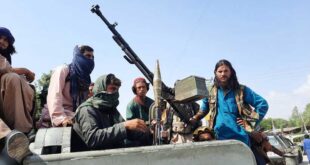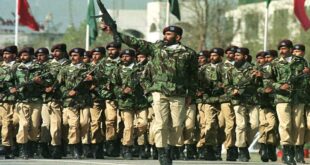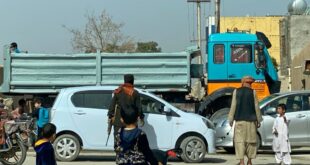OTTAWA — As a chorus of protest rang out from Parliament’s upper public galleries, the House of Commons voted overwhelmingly Thursday night to extend Canada’s military mission in Afghanistan to 2011.
Though the result was never in doubt, the outburst of more than two dozen anti-war protesters chanting, “End it, don’t extend it,” from the Commons’ public galleries added a poignant dramatic twist as they were peacefully escorted out by security guards.
Both the minority Conservative government and the Liberal opposition heralded the vote as a historic compromise that set aside partisan politics and advanced Canada’s international interest, as they easily passed the motion by a 197-77 margin.
“What you saw in the House, the expressions whether they be through votes or what was said in the gallery, are expressions of a country that has a healthy, vibrant democracy. We hope that some day we will be able to see that type of diversity and freedom of expression in Afghanistan,” Defence Minister Peter MacKay said afterwards.
“That’s exactly what we’re there to do.”
Liberal defence critic Denis Coderre said the vote gives the official Opposition the tools they need to keep the government accountable as the mission in Afghanistan moves forward.
“We did the right thing for Canada. We did the right thing for the Afghan people,” said Mr. Coderre. “It’s not a partisan discussion today we witnessed. We’ve been there for Canada, and for our future in the world.”
The vote to keep Canada’s 2,500 soldiers in Kandahar until the end of 2011 is conditional on NATO providing an extra 1,000 troops to the war effort in the south, and on Canada coming up with transport helicopters and unmanned aerial vehicles.
“We’re in the final stages of a very aggressive effort to secure those helicopters,” after having secured two from Poland, said Mr. MacKay, adding he was optimistic Canada would be able to buy time on UAVs already operated by its allies in Afghanistan.
Thursday’s show of political support will be a relief to Canada’s allies as Prime Minister Stephen Harper travels to the NATO leaders’ summit in Bucharest, Romania, in three weeks, where the alliance is expected to unveil Canada’s new military partner in southern Afghanistan.
Though there have been no formal public guarantees, top officials in the Bush administration as well as senior Pentagon figures have virtually vowed that the U.S. would underwrite the extra 1,000 troop requirement if another ally does not step forward.
France is expected to join Canada, but it appears they could be headed to the equally volatile eastern Afghanistan, along the Pakistani frontier, to help U.S. troops block the influx of al-Qaeda and Taliban fighters.
The motion plays up diplomatic and development efforts as well as the training of Afghan troops, even though the unstable reality on the ground means that the Canadian Forces will still have to engage in combat.
The NDP and Bloc Quebecois opposed the motion but lacked the numbers in the Commons that would have toppled the government and plunged the country into a federal election.
“We have not supported the notion of prolonged warfare,” said NDP Leader Jack Layton. “We’ve been there six years and this is going to add three more years . . . I never thought that we’d see an extension.”
Eighty Canadian soldiers and one diplomat have died in Afghanistan since the mission began in early 2002.
Thursday’s vote ended the most extensive and wide-ranging of debate in Canada’s Parliament since it began sending soldiers to Afghanistan.
Contrary to the compressed 48-hour debate that preceded the last vote in Parliament in May 2006, this current round unfolded over five days beginning on Feb. 25. The May 2006 vote extended the mission by two years to February 2009 by a slim 149-145 margin.
Mr. MacKay opened this most recent debate on Feb. 25, with a rare call for non-partisan unanimity.
“This is perhaps the most important debate facing our Parliament and our nation today,” Mr. MacKay said. “It has important broad implications for Canada, Afghans and the world.”
Debate continued until late Thursday afternoon until a final vote was taken Thursday evening.
As the Conservatives were voting in unison, the protesters in the public gallery, a collection of university aged youth accompanied by a few graying older adults, were hustled out by Commons security.
Two hours before of the final head count, an unofficial tally found that more than one-third of MPs from all parties had either made speeches or debated on the floor of the Commons, including 52 Conservatives, 35 Liberals, 20 New Democrats, 10 Bloc Quebecois and one independent.
As a Conservative backbencher pointed out Thursday morning, Canada’s involvement in Afghanistan flows from the Sept. 11, 2001, terrorist attacks on the U.S., and has since grown into an international effort, legally endorsed by the United Nations, to rebuild a battered country and prevent it from becoming a failed state that could become the haven for terrorism that it once was.
“We told our allies that we would be there, that they could depend on us, and we told the men, women and children of Afghanistan that we would not abandon them to the fate of the Taliban and al-Qaeda and to that Canada must hold true,” said Blaine Calkins, a 39-year-old rookie MP from Alberta.
But as NDP MP Joe Comartin said, Canada’s involvement has come at heavy cost, and it has given more than enough to its allies.
“They love us being there because our soldiers are dying, not theirs. In fact, our soldiers are dying at a much higher rate than American soldiers,” said the southwestern Ontario MP from Windsor-Tecumseh.
 Eurasia Press & News
Eurasia Press & News



